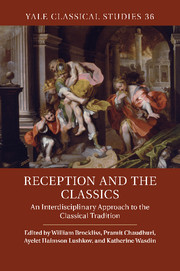Book contents
- Frontmatter
- Contents
- Notes on contributors
- Acknowledgements
- Chapter 1 Introduction
- Part I Reception between Transmission and Philology
- Part II Reception as Self-Fashioning
- Chapter 6 Petrarch's epistolary epic: Letters on Familiar Matters (Rerum familiarum libri)
- Chapter 7 The first British Aeneid: a case study in reception
- Chapter 8 Ovid's witchcraft
- Chapter 9 The streets of Rome: the classical Dylan
- Part III Envoi
- Bibliography
- Index
Chapter 9 - The streets of Rome: the classical Dylan
from Part II - Reception as Self-Fashioning
Published online by Cambridge University Press: 05 December 2011
- Frontmatter
- Contents
- Notes on contributors
- Acknowledgements
- Chapter 1 Introduction
- Part I Reception between Transmission and Philology
- Part II Reception as Self-Fashioning
- Chapter 6 Petrarch's epistolary epic: Letters on Familiar Matters (Rerum familiarum libri)
- Chapter 7 The first British Aeneid: a case study in reception
- Chapter 8 Ovid's witchcraft
- Chapter 9 The streets of Rome: the classical Dylan
- Part III Envoi
- Bibliography
- Index
Summary
Immature poets imitate; mature poets steal; bad poets deface what they take, and good poets make it into something better, or at least something different. The good poet welds his theft into a whole of feeling which is unique, utterly different from that from which it is torn; the bad poet throws it into something which has no cohesion. A good poet will usually borrow from authors remote in time, or alien in language, or diverse in interest.
T. S. Eliot, from “Philip Massinger” (1920)Taming the proud: the case of Virgil
For those of us – and there are a few of us in my neck of the woods – interested in the Roman poet Virgil and in the art of Bob Dylan, the strange days that followed September 11, 2001 were particularly memorable. Dylan's two-year stint in the Hibbing High Latin Club was at that point unknown to me. In the summer of 2005 a trip to the Seattle Music Experience revealed his early interest, set out on the page of the Hibbing High School yearbook, the Hematite, as it is called. The page is also featured in Scorsese's No Direction Home. But even on the first time through “Love and Theft”, even before we had noted the quotes around the title that drew attention to the theft of Eric Lott's title, before we had been handed the snippets of Confessions of a Yakuza, transformed into Appalachian and other vignettes, there was Virgil, loud and clear, in the tenth verse of “Lonesome Day Blues” (itself a Blind Willie McTell title):
“Lonesome Day Blues”: I’m gonna spare the defeated – I’m gonna speak to the crowd / I’m gonna spare the defeated, boys, I’m going to speak to the crowd / I am goin’ to teach peace to the conquered / I’m gonna tame the proud
Virgil, Aeneid 6.851–3 (trans. Mandelbaum): but yours will be the rulership of nations, / remember Roman, these will be your arts: / to teach the ways of peace to those you conquer, / to spare defeated peoples, tame the proud.
Teaching peace, sparing the defeated and taming the proud. Too much precision there for accident, even without the album's title or Junichi Saga's presence. Now Virgil's Latin is close to the translation I give, but Latin it is, with the three Roman arts spread over a line and a half:
tu regere imperio populos, Romane, memento
(hae tibi erunt artes) pacique imponere morem
parcere subiectis et debellare superbos.
The Latin in fact has four Roman qualities: “to rule over people with empire, to institute law in addition to peace, to spare the subjected, and to war down the proud.” If I had given that translation, and it is more “faithful” to the Latin though less poetically put, there might be doubt as to whether Dylan was alluding at all. But that is the point: Dylan's intertext is not the Latin of Virgil – though Hibbing High's Robert Zimmerman may possibly have gotten far enough in his Latin to have read some Virgil back then. Rather, Dylan read, as I have given it, the 1971 English translation of Allen Mandelbaum, the best contemporary translation until 2005, when Stanley Lombardo's excellent new version arrived on the field.
- Type
- Chapter
- Information
- Reception and the ClassicsAn Interdisciplinary Approach to the Classical Tradition, pp. 134 - 160Publisher: Cambridge University PressPrint publication year: 2011

